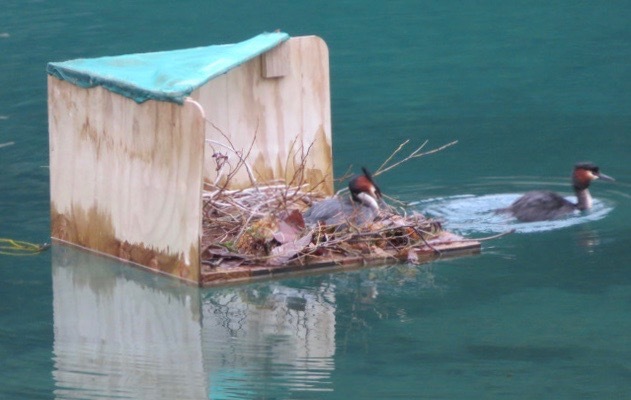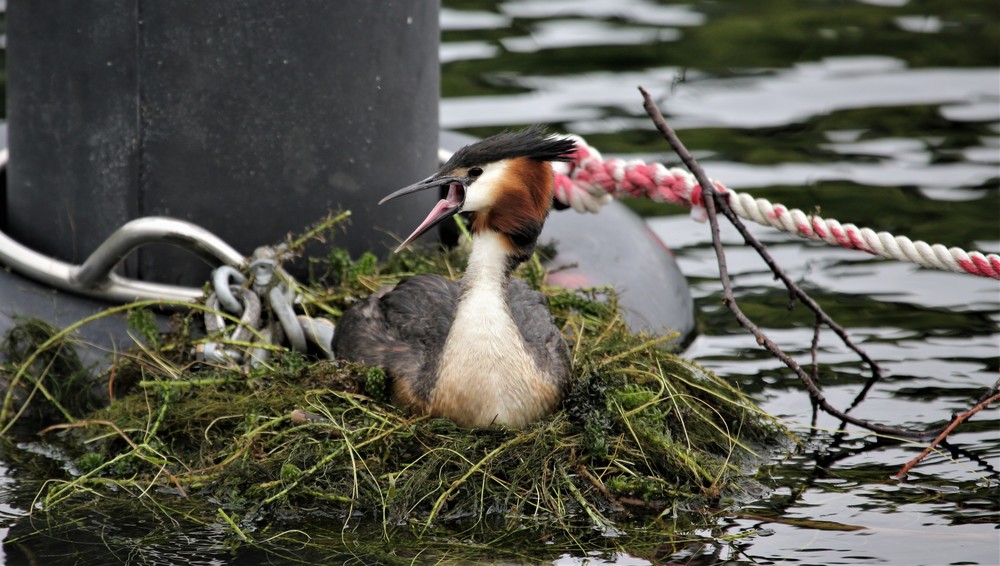Grebes breeding season gets off to a good start
Diana Cocks
05 September 2021, 6:04 PM
 Construction of the boardwalk (under blue tarpaulin) hasn’t appeared to bother Lake Wānaka’s grebes during breeding season. PHOTO: Wānaka App
Construction of the boardwalk (under blue tarpaulin) hasn’t appeared to bother Lake Wānaka’s grebes during breeding season. PHOTO: Wānaka AppThe high levels of Lake Hāwea have contributed to a potentially early start of the breeding season for the lake’s resident grebes, but the Covid-19 restrictions are constraining the ability to build more nesting platforms.
Southern crested grebes successfully raised two families of chicks from man-made platforms on the inlet beside the ANZAC memorial at the Lake Hāwea dam for the first time last year and Guardian of Lake Hāwea Amie Capell said with the lake at the highest level for this time of year in ten years, the nesting platforms on the water were immediately attractive.

“The birds apparently came straight over to inspect what was going on during the installation process and had occupied the platform within a few hours,” she said.
A second platform has been placed in the same spot “in the hope that the grebes have spread the word since last year,” Amie said.

Lake Hāwea grebes immediately took to the just installed nesting platform last week. PHOTO: John Langley
The birds have occupied the platform on and off, although there are no indications that they have begun nesting.
An additional platform has been installed at The Neck and another is planned for Silver Island when Covid alert levels ease, she said.
This early activity on Lake Hāwea reflects a similarly busy nesting season on Lake Wānaka with the first chick hatched last week (August 29).
“What has been so different about this year is not so much that they are early, but so many of them are early at the same time,” resident grebe expert John Darby said.

With the acute shortage of platforms, this is one of three birds that have built their nest onto one of the buffer poles that divide marina berths. PHOTO: John Darby
The greatest concern at present, however, was insufficient suitable nesting platforms on Lake Wānaka. Already there are seven occupied but “there are territorial fights going on most of the time with additional pairs of birds seeking nest space”, John said.
Markus Hermann, who has taken over managing the grebes, had to rescue a sinking nest complete with three eggs but two additional nests have been built on marina berth dividers and another attached to a pontoon and unless those nests can be relocated they will fail, John said.
The decision was made to replace the platforms built with plastic buoyancy (which disintegrated over time) with something more environmentally suitable. Mount Aspiring College agreed to produce six new platforms but Covid-19 restrictions closed the school before they could be finished.
The grebes appear to have adjusted well to the construction of the lakeside boardwalk as well as repairs to the marina.
“All this augers for a good season with most early birds nesting at least twice and possibly three times,” John said.





